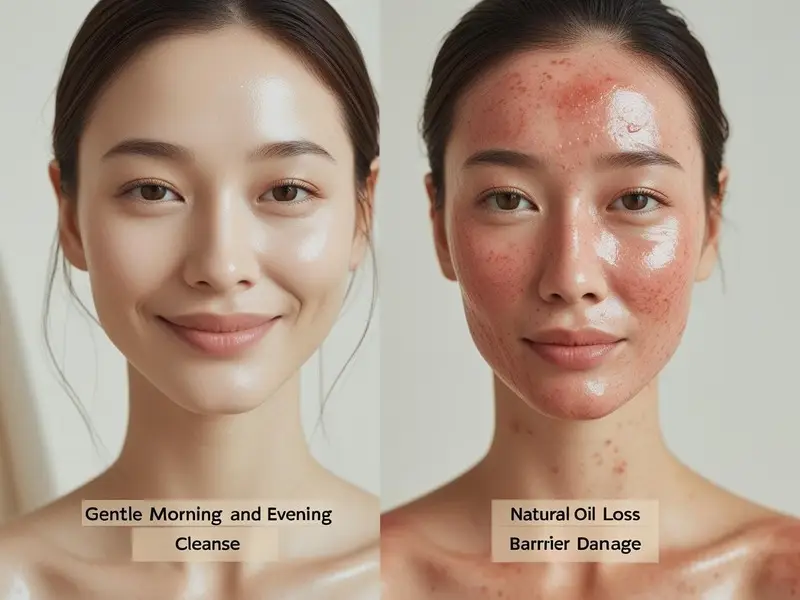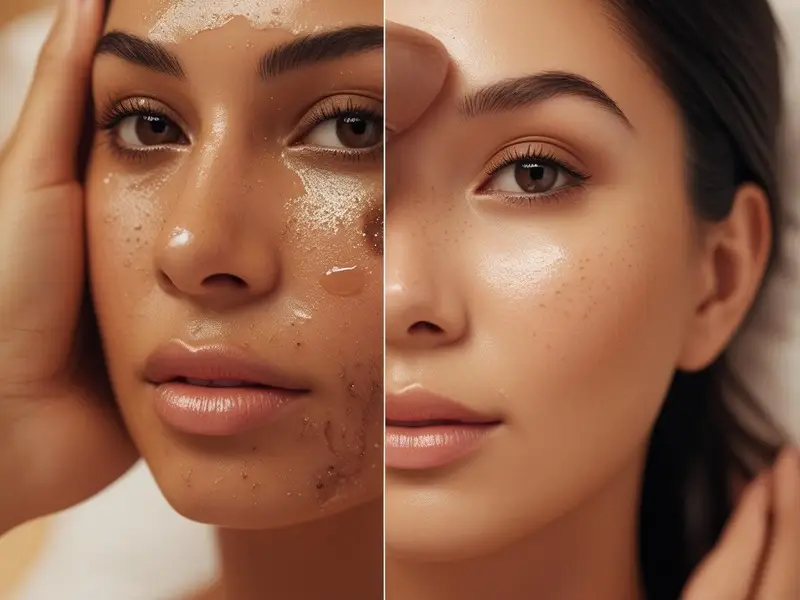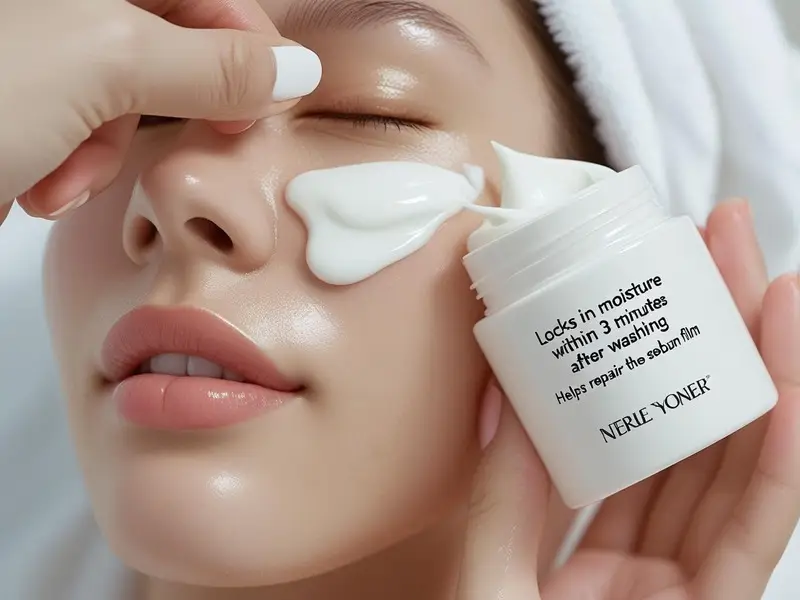Many people have this misconception: frequent face washing means cleaner and clearer skin. This can be especially relevant for those with oily and acne-prone skin who think that washing their face often is the solution to their problems. After all, dirt, oil, sweat—aren’t they bad for the skin and removing them possible?
Instead of making your skin better, you might actually harm it by the over-cleansing habit. Over-washing can lead your skin to be dry and deprived of its natural oils. It can also cause potential breakouts or irritation.
In this text, we aim to describe the matter of face washing in various scientific ways, provide information about the possible frequency of skin cleansing and give the most important suggestions for your skin’s good look as a result of the experts’ knowledge.

Why Is Washing Your Face Essential?
Let’s do the first things at first! Dust particles, bacteria, sweat—faced it all, right? To keep your face clean you may achieve it by washing it off of:
- Heavy makeup, oil, and dirt
- Residual sunscreen and makeup
- A breakdown of plugged pores and pimples
- Skin refreshment at the end of a long day
- Reception of moisturizer or treatment procedures for your clean skin
Cleansing your face on a regular basis is a must-have step if you want to have they fresh and healthy-looking skin. However, both the way and the number of times of your face cleaning are important to achieve this result.
Is Over-Cleaning a Real Thing?
Yes, definitely. It might sound weird, but overdoing anything can be a mistake, likewise overwashing your skin. The key reason why people do that if they are not aware of it is because usually, fresh looks and cleanliness are associated with regular face washing.
So here’s what happens if you wash too frequently:
1. Strips Natural Oils
Our skin has a protective barrier called the lipid barrier which is made up of natural oils and moisture. If you wash it too often, the natural oils will be gone, the skin will be dry and will be damaged by the environment.
2. Triggers Rebound Oil Production
Dry skin overcompensates for the lack of oil content by generating more oil, which in turn clogs up the pores and may result in acne. Strangely, over-treatment for oily skin will irritate it further.
3. Leads to Redness and Irritation
The act of cleansing too many times—especially when harsh products are being used—can bring on such symptoms as inflamed skin, redness, itching, and a tight, uncomfortable feeling.
4. Weakens the Skin Barrier
Regular washings can cause the skin to lose the ability to retain water and gain new contaminants which in turn cause the skin to further break out, suffer from eczema, and become sensitive.
How Often Should You Wash Your Face?
The Golden Rule: Twice a Day
In the opinion of most people, the advice of dermatologists stipulates that the face is washed twice every day:
- Morning: This is a good habit, as you can remove the sweat, sebum, and night product residues. It also allows the skin to absorb the protective sunscreen from the makeup applied
- Evening: By all means, yes, it’s imperative. Before going to bed, you should cleanse your skin. This is the perfect time to get rid of the dirt, pollution, and makeup from the day.
When More Than Twice a Day Is Okay
There are exceptions. You may find it necessary to wash your face a third time during the day if it’s any of the following cases:
- You’ve worked out or sweated heavily
- You live in a hot, humid climate
- You’ve applied thick sunscreen or makeup midday
- Your skin feels excessively oily or dirty
In such cases, use a gentle, non-stripping cleanser, and always follow with a lightweight moisturizer.
When Once a Day Might Be Enough
If you have very dry, sensitive, or mature skin, washing just once a day in the evening may be better. How about morning a splash of lukewarm water or gentle micellar water?

Skin Type Matters: Tailor Your Routine
Each person should evaluate his/her skin type so that he/she can decide the frequency of face wash and the type of cleanser to use.
Oily Skin
- You may benefit from washing 2–3 times a day with a foaming or gel cleanser.
- Avoid products that overdry or strip the skin, as they can trigger more oil production.
Dry or Sensitive Skin
- Stick to once or twice a day with a creamy, hydrating cleanser.
- Avoid alcohol-based or fragranced cleansers, which can worsen dryness and irritation.
Combination Skin
- Use a gentle, balanced cleanser twice daily.
- Consider a foaming cleanser in the T-zone and a cream-based cleanser on drier areas. KhI0hFIoJ0M&feature=youtu.be
Wash your face correctly and use a gentle acne-fighting cleanser (with salicylic acid or benzoyl peroxide) twice daily.
- Do not wash often since it makes the skin too dry, too sensitive, and that can make acne worse.
What Signs That You Are Washing Your Face Too Much
Do you know the signs that show that you have already washed your face too much? The most common signs of over-washing are as follows:
- Your skin feels stretched and parched after cleansing
- The skin turns to be reddish and scaly and seems to have been irritated
- There is an obvious increase in the number of outbreaks or in the amount of oil on the skin
- Your skin burns or stings while you apply your moisturizer
- There is a visible lack of luster and/or unevenness in the skin
If any of the above-mentioned symptoms happen to you, consider less frequent use of the cleanser and look for a hydrating product of the same kind.
How to Properly Cleanse Your Face
Face washing is not tricky but doing it the right way leads to better results. Here is the proper way of cleansing your face:
- Use lukewarm water: Hot water can strip the skin and cause irritation.
- Choose a gentle cleanser: Avoid soap, harsh scrubs, or high-alcohol formulas.
- Massage in circular motions: Use your fingertips to gently massage the cleanser into your skin for 30–60 seconds.
- Rinse thoroughly: Leftover cleanser can clog pores or cause dryness.
- Pat dry with a clean towel: Don’t rub—rubbing can irritate the skin.
- Apply moisturizer immediately: This helps lock in hydration and restore your skin’s barrier.
Optional: Use micellar water or a cleansing balm as a first step if you’re wearing heavy makeup or sunscreen, followed by a second cleanser (“double cleansing”).
Morning vs. Night: What Is More Important?
If you had the option to pick only one time to wash your face daily, choose the evening before you sleep. At this time, your skin is already drenched in sweat and oil, full of makeup, and dirt from the air. By going to bed with all of this stuff on your skin, it will result in clogged pores and inflammation.
Nevertheless, the task of cleaning in the morning is not pointless. It takes away the surface oil and makes it easier for the skin to absorb daytime skincare products. Also, for people with very dry and sensitive skins, washing their face only with clear water in the morning could be an alternative, if not a more suitable thing to do.
Myths About Washing Your Face
Now, let’s see some of the most popular misconceptions of washing our faces and bust them.
- Myth: Whenever the face looks or feels greasy, that’s when you should cleanse it. ➤ Fact: If your skin feels greasy, you might need to use less or a different product, as it seems that your skin dries out during the wash, and then, to stop the cleanser, you need to reapply moisture.
- Myth: Acne is caused by not enough washing of the face. ➤ Fact: Insufficient hygiene is a reason for acne, but more often, the problem lies in inflammation, hormonal imbalance, or the skin’s genetics. In other words, acne is not simply caused by dirty skin.
- Myth: A good scrubbing is more effective for dirty skin. ➤ Fact: With the skin’s protective barrier damaged by excessive scrubbing, breakouts and sensitivity will only get worse.
Conclusion: Clean Skin Does Not Equal Washing It Too Much
So now, clean skin more washed skin?
No, not necessarily. In reality, the act of overdoing it with the cleanser may result in the opposite effect—by doing this, your skin is stripped off, irritated, and is likely to produce even more oil. The answer is moderation.
- It is the general consensus that twice a day is best for the majority of people.
- Select a cleanser that matches your specific skin type.
- Feel your skin and take into account how it feels, not merely how it looks.
- If you are not sure, be extra gentle and keep it up. It is not as easy as it might seem to win the skincare race.
Being clean is not the same as being free from dirt and grime, it is about finding peace in the existence of a well-functioning, and well-watered organism. Any careless words will get the same results.

Frequently Asked Questions (FAQ)
Q: How many times a day should I wash my face?
A: Twice daily is the most appropriate time for most skin types to wash their face. There are probably a few, mostly those with dry skin, that can do it only once a day.
Q: Can washing my face too much cause acne?
A: Indeed it can. By over-washing the skin you remove protective oils resulting in the skin getting more oily, and this may lead to bursts of pimples.
Q: Should I wash my face after sweating?
A: Absolutely. It is recommended to cleanse the face from sweat, salt, harmful bacteria, and oil residues after having finished physical activities, and most of them will guarantee you that your pores won’t get cluttered.
Q: What kind of cleanser should I use?
A: You should use a cleanser that is appropriate for your skin type. In other words, if you have oily skin, a gel cleanser is the best choice, if you have dry skin, cream cleansers should be your pick, and in case you have sensitive skin, then an unscented product is OK.
Q: May I wash my face with just water in the morning?
A: Water is enough for the dry and sensitive skin types. It’s a light oil that can be removed by water without peeling off the skin.